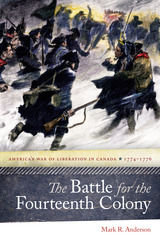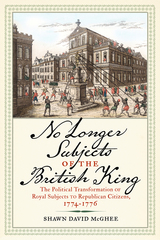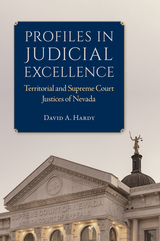2 books about 1774 - 1776

The Battle for the Fourteenth Colony
America’s War of Liberation in Canada, 1774–1776
Mark R. Anderson
University Press of New England, 2013
In this dramatic retelling of one of history’s great “what-ifs,” Mark R. Anderson examines the American colonies’ campaign to bring Quebec into the Continental confederation and free the Canadians from British “tyranny.” This significant reassessment of a little-studied campaign examines developments on both sides of the border that rapidly proceeded from peaceful diplomatic overtures to a sizable armed intervention. The military narrative encompasses Richard Montgomery’s plodding initial operations, Canadian partisan cooperation with officers like Ethan Allen, and the harrowing experiences of Benedict Arnold’s Kennebec expedition, as well as the sudden collapse of British defenses that secured the bulk of the province for the rebel cause. The book provides new insight into both Montgomery’s tragic Québec City defeat and a small but highly significant loyalist uprising in the rural northern parishes that was suppressed by Arnold and his Canadian patriot allies. Anderson closely examines the evolving relationships between occupiers and occupied, showing how rapidly changing circumstances variously fostered cooperation and encouraged resistance among different Canadian elements. The book homes in on the key political and military factors that ultimately doomed America’s first foreign war of liberation and resulted in the Continental Army’s decisive expulsion from Canada on the eve of the Declaration of Independence. The first full treatment of this fascinating chapter in Revolutionary War history in over a century, Anderson’s account is especially revealing in its presentation of contentious British rule in Quebec, and of Continental beliefs that Canadiens would greet the soldiers as liberators and allies in a common fight against the British yoke. This thoroughly researched and action-packed history will appeal to American and Canadian history buffs and military experts alike.
[more]

No Longer Subjects of the British King
The Political Transformation of Royal Subjects to Republican Citizens, 1774–1776
Shawn David McGhee
Westholme Publishing, 2024
When news reached Parliament of the Boston radicals’ destruction of the Royal East India Company’s tea, it passed the Coercive Acts, a collection of punitive measures designed to rein in that insubordinate seaport town. The Coercive Acts unleashed a political firestorm as communities from Massachusetts to Georgia drafted resistance resolutions condemning Parliament’s perceived encroachment upon American liberty. Local leaders also directed colonists to refrain from purchasing British merchandise and forego theater, horse racing, and other perceived debauched traditions. Local activists next convened the Continental Congress to coordinate a pancolonial resistance movement to pressure Parliament into repealing the Coercive Acts and settling American rights on a constitutional foundation. Once convened, Congress deftly drafted the Articles of Association. Traditionally understood as primarily an economic response by the colonies to Parliament’s actions, the Continental Association called for public demonstrations of commercial and cultural restraint, conduct delegates hoped would both heal the empire and restore colonial virtue.
Historian Shawn McGhee offers a fresh perspective on the origins of American political identity. No Longer Subjects of the British King: The Political Transformation of Royal Subjects to Republican Citizens, 1774-1776reveals the crucial process by which the Continental Association organized American towns and counties into a protonational community of suffering to protect political identities they felt under threat. This work further demonstrates how those sacrificing for the common cause severed their bonds of allegiance to the British king and separated from the broader imperial nation. In this crucible of austerity, they formed an American political community, completing the political transformation from subject to citizen.
Historian Shawn McGhee offers a fresh perspective on the origins of American political identity. No Longer Subjects of the British King: The Political Transformation of Royal Subjects to Republican Citizens, 1774-1776reveals the crucial process by which the Continental Association organized American towns and counties into a protonational community of suffering to protect political identities they felt under threat. This work further demonstrates how those sacrificing for the common cause severed their bonds of allegiance to the British king and separated from the broader imperial nation. In this crucible of austerity, they formed an American political community, completing the political transformation from subject to citizen.
[more]
READERS
Browse our collection.
PUBLISHERS
See BiblioVault's publisher services.
STUDENT SERVICES
Files for college accessibility offices.
UChicago Accessibility Resources
home | accessibility | search | about | contact us
BiblioVault ® 2001 - 2025
The University of Chicago Press









